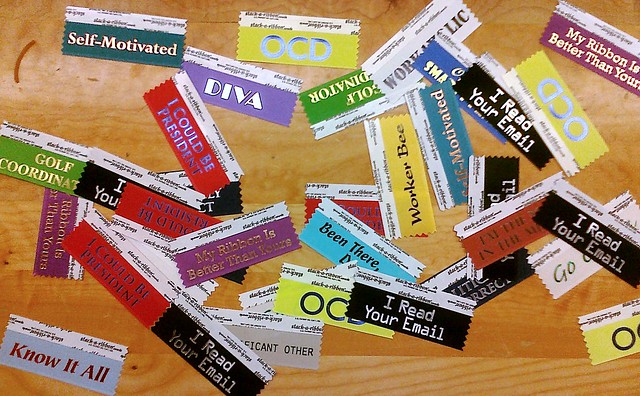Edit: Despite my clarifications, people are still misinterpreting my original post as a proposed 'solution' to the problem of the Library degree, so I've rewritten this to stop that happening. ====
To embark upon a Library Masters in 2014 is a huge undertaking. Assuming you do it part-time, whilst working to support yourself, you’ll spend between ten and eighteen thousand pounds over two years, along with, at a conservative estimate, 1500 hours of your time.[1]
The question is, does the Library degree really represent the best use of this investment?
What if you were to spend the same amount of time and money on a self-structured curriculum of study, events, conferences, training, and building an online portfolio, whilst continuing to work in an information role. Would you not emerge as a more rounded, knowledgeable, and relevant information professional?
I think you would. If someone were to try it, the results would certainly be interesting. This is not, however, a solution to the problem.
The problem with the Library degree
I have many issues with the MA/Msc in Library & Information Management (or similar) as it currently stands, in the UK. For the record, I completed mine, via distance learning, in 2009. It was fine, I didn’t hate it, it wasn’t a bad degree in any way. My views on the degree are based on my own experience, and based on talking to others – I realise they may not be universal complaints. But here are the main ones anyway:
1) Much of the content of the courses does not seem relevant to actually being an information professional
2) There is one degree that is supposed to cover, in one year of full-time study, all aspects and types of librarianship, including public, academic and special librarianship (not to mention the myriad other potential careers under the information umbrella). As far as I can tell these disciplines are very different from each other
3) Many of the courses contain modules they contained 10 years ago, despite the information world having undergone seismic shift in that time. Anything you learn on a library degree is likely to be out of date in two to five years anyway
4) Having completed a Masters in another discipline prior to getting my Library one, I did not find the latter to be postgraduate in nature. It was just like a very short undergraduate course
5) The piece of paper at the end – the degree certificate which allows you to apply for higher graded jobs for which a qualification is an ‘essential’ on the person spec – seems far more important than what you learn on the course itself
6) The difference between a ‘qualified’ librarian and an ‘unqualified’ one is very rarely the qualification. It’s more often that the unqualified librarian’s circumstances are such that they have been unable to do the degree, rather than that they are in any way a lesser librarian
7) The process by which CILIP accredits degrees and the institutions which offer them does not seem to be in any way rigorous, based on the experiences of colleagues who have attended certain institutions…
8) To add insult to the injury of the points above, there are many more qualified librarians than there are posts for qualified librarians – meaning that in my own institution alone there are several very talented new professionals who have gone to the time and expense of getting the degree, but who are nevertheless in the same roles they were in whilst they studied
Most importantly, the degree is so expensive that it is actively excluding people from good jobs – we are putting a financial price on progress in our profession, and for what? A degree that isn’t particularly relevant or, in some cases, even particularly enjoyable to complete. I don’t think it’s acceptable that we’re all of us complicit in such a flawed system. Employers, students, CILIP, people like me who recognised the issues but did the Masters anyway just to get the piece of paper – we’re all part of the problem with the Library degree.
If you are going to create a professional environment in which a ten thousand pound degree is necessary to earn more than £25,000 a year, then the degree itself needs to be a LOT more meaningful than it is at present.
What do we do about it?
If it were up to me, I’d do two things:
A) re-design the Masters to be a Problem Based Learning (PBL) degree, which would allow a much closer connection between study and the reality of library work, and
B) issue some kind of nation-wide edict forcing all hiring library managers to give proper value to the second half of the sentence ‘Library qualification or equivalent experience’ which appears on so many job specs.
There are actually a pleasingly high number of hiring managers who do 'B' already, although it's not that wide-spread. But 'A' is a lot trickier.
I am writing (or was writing - we'll get there eventually!) an article with Alan Carbery about rethinking the degree as PBL. I find PBL incredibly difficult to explain succinctly - basically it's student centered learning, that is used in a lot of Medical Schools around the UK (including the one in my own institution). It's really very different from the traditional HE pedagogy. Here's an excerpt from what the BMJ has to say about it (read the whole page here)
In problem based learning (PBL) students use “triggers” from the problem case or scenario to define their own learning objectives. Subsequently they do independent, self directed study before returning to the group to discuss and refine their acquired knowledge. Thus, PBL is not about problem solving per se, but rather it uses appropriate problems to increase knowledge and understanding. The process is clearly defined, and the several variations that exist all follow a similar series of steps.
It sounds like it shouldn't work, but it does. Students absolutely love it. At my University it is also used, with great success, by the Law School, and it is their approach specifically that I'd like to see emulated with libraries. Here's what the Law School has to say about it:
You and your colleagues decide how your firm operates and determine how to divide up the work. Through the process you will build working relationships with each other and learn how to deliver on your responsibilities.
For each case you will identify the legal principles involved in the problem and unravel the legal and contextual issues that lie at the heart of it, which will typically involve more than one area of law. All of the problems will be simulated real-life examples brought to you by virtual clients.
In many situations you will have to interact with other student firms, sometimes working alongside them, sometimes in opposition.
For me this notion of operating in firms with real-life examples is key. Based on UCAS applications etc the Law School tailors each firm to suit the personalities and talents of the people involved.
Imagine arriving at Library School and being divided up into Libraries, and then given real-life, pertinent, and up to date examples of problems Libraries face. You'd work cooperatively with your peers (and in the era of constant-contact media, Google hangouts etc, distance-learning shouldn't prohibit this) and deal with things which you really will have to deal with when working in a qualified library post. Issues around web-design and social media, around marketing and communications, around copyright, data protection and FOI, around managing budgets in difficult economic circumstances, around whatever is relevant and important, year on year. It's not just that it allows Library Schools to cover contemporary issues, it's the manner in which it is taught, which seems to relate more directly to the real world. Here's another quote, from the Law School's guide to students on their use of PBL:
The key role of the problem is to trigger your awareness that these issues exist, and create an interest in them by highlighting their real-world ramifications. Once this has happened, the problem then gives you a context which you can use to identify exactly what you need to learn in order to understand the problem and address the issues which it raises.
This, to me, sounds like the kind of approach which has the potential to produce Library Masters graduates who are significantly more qualified, aware, relevant and prepared, for the real-life world of libraries. In fact it's a bit like what we all do with our CPD anyhow.
Clearly this would be a massive shift in how things are done. Any library school attempting to implement this would have to completely scrap the existing degree and build a new one from the ground up. But I'd argue that needs to happen anyway; perhaps a new teaching method would add much needed impetus and inspiration.
I'd be interested if anyone reading this who is familiar with PBL, or with teaching on current Masters courses, has a view on this! Is it the kind of thing we could realistically do?
[1] You are notionally expected to spend 100 hours of study per 10 credits on the Masters – assuming you do the dissertation as well, there are 180 credits in the degree, so the total figure is 1,800 hours. I don’t believe anyone has ever spent 225 full 8-hour days studying for a Library Masters, so I reduced it to 1,500 hours, although that still seems fairly fanciful.


